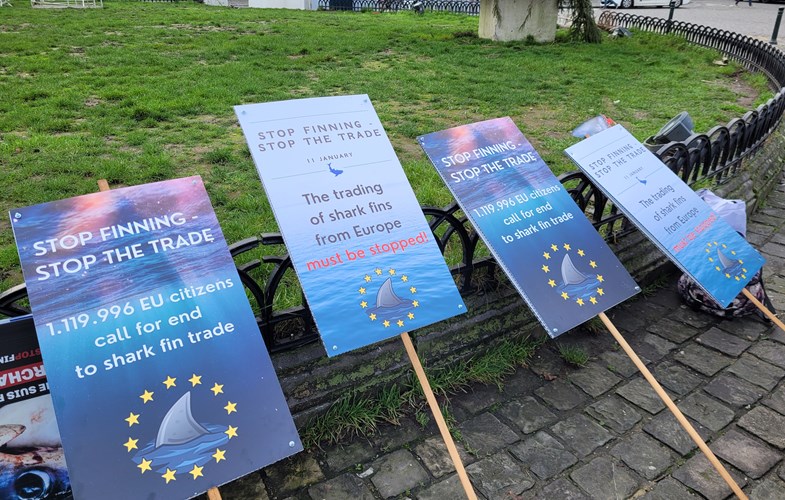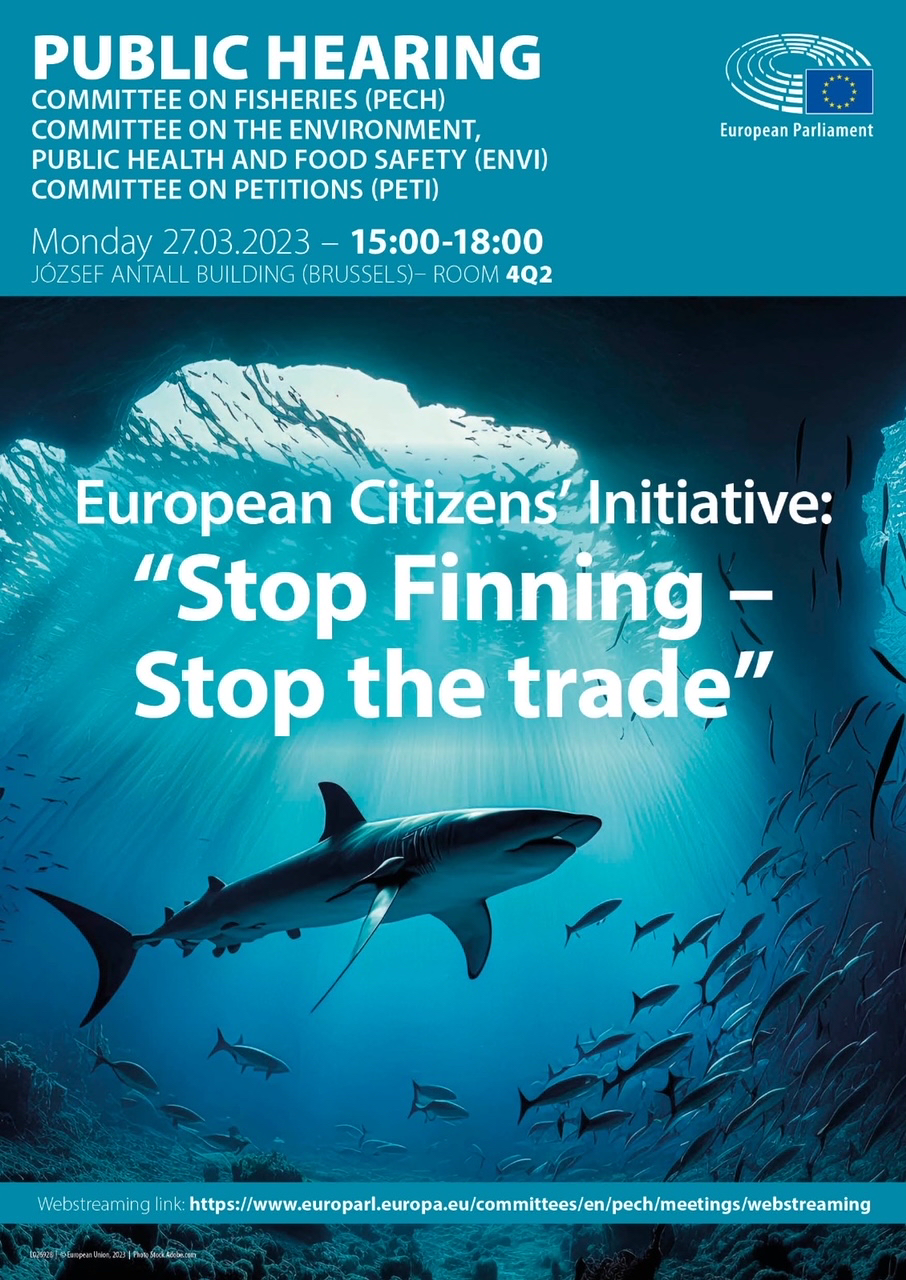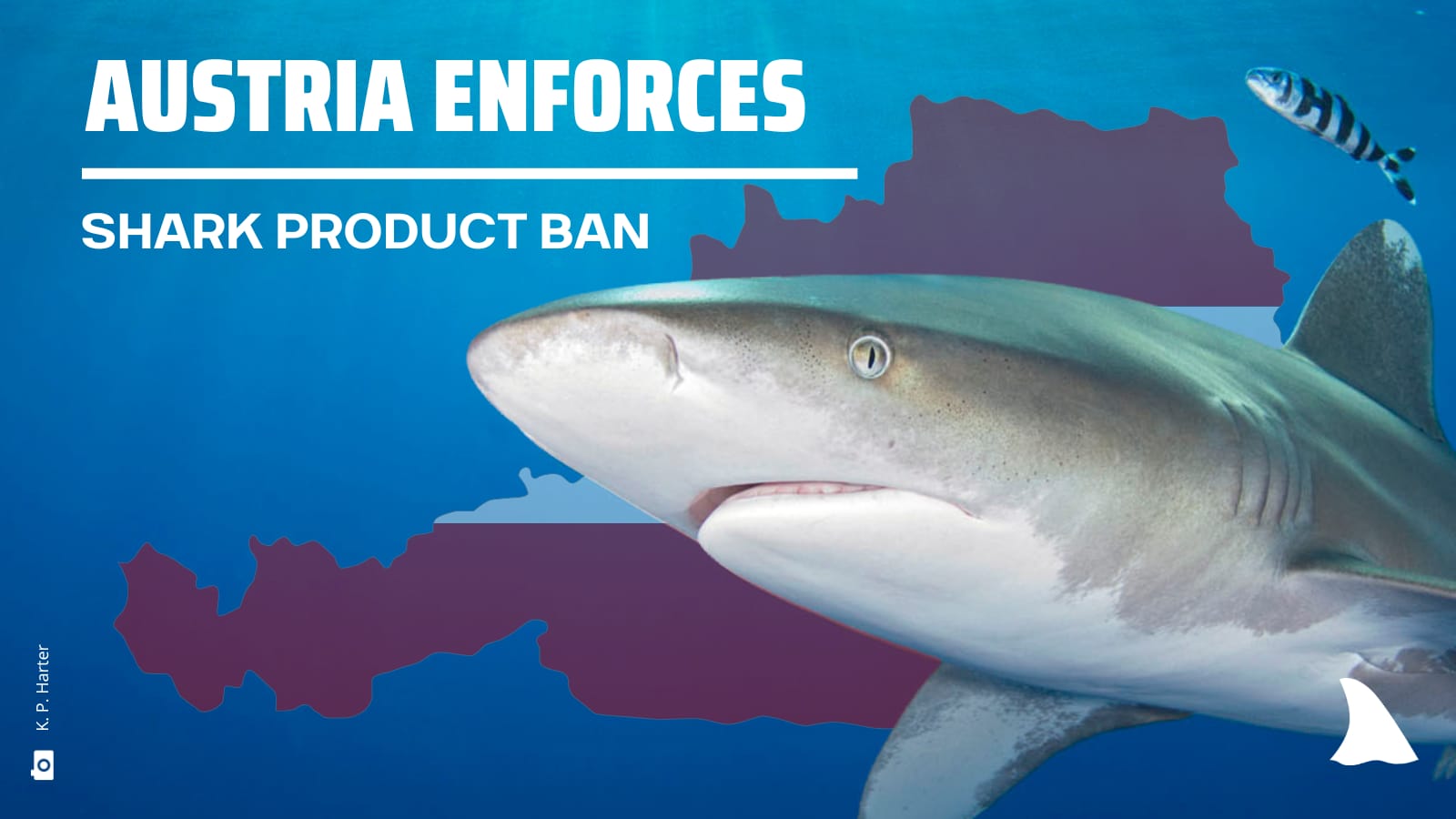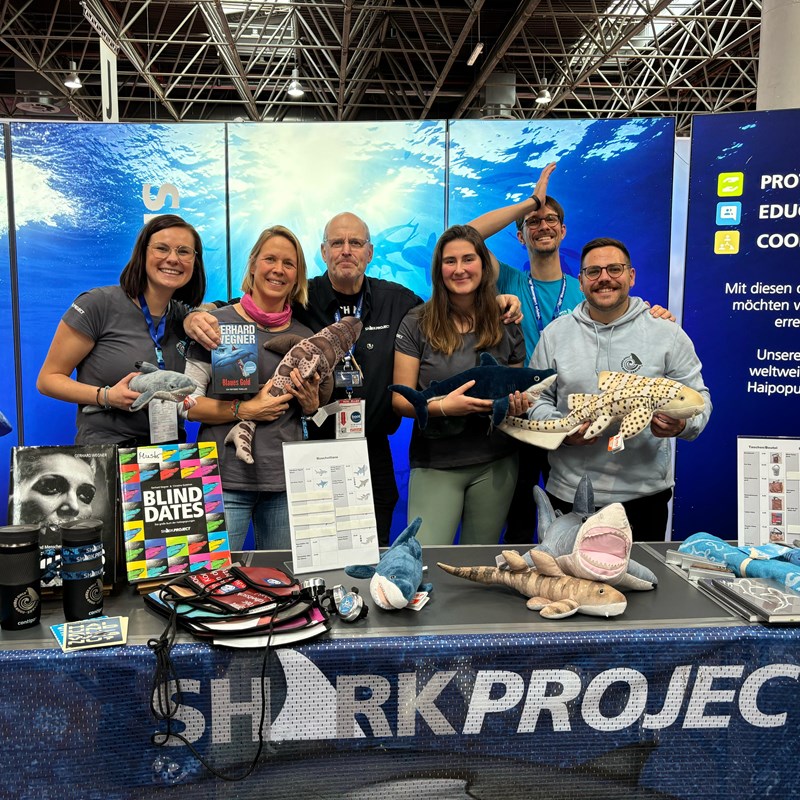

1.1 million Europeans and over 100 NGOs call for an end of the fin trade in the EU
23. March, 2023
Trade ban remains the only solution to stop the global mass exploitation of sharks by the international fin trade

© Petra Schwerdtfeger
No species should be threatened by extinction as a result of international trade, and certainly not because of the value of a single part of their body. Conservationists, politicians and the general public are relatively unanimous on this, at least when referring to terrestrial species and marine mammals. But what about the sea creatures that we commonly just think of as fish and that are massively caught both in European waters and worldwide primarily for their fins - as a target species or as a welcome bycatch in fisheries?
Sharks and rays (collectively known as elasmobranchs) are essential for healthy and resilient oceans, and these in turn are our last bastion against an accelerating climate change. Sharks play an indispensable role in the complex marine food webs and are often referred to as the health police of the seas for good reason. Evidence shows that reefs and regions where healthy shark populations still exist are ecologically more diverse and also more abundant in fish. But worldwide, biodiversity and fish stocks are declining dramatically, causing increasing problems specifically for food security in the Global South, but also for our climate. More than 50% of our oxygen comes from the oceans and a large part of the greenhouse gases emitted by humans have so far been absorbed by the oceans - all of which are indispensable ecosystem services provided by the oceans. In order to ensure that these functions continue to be provided also in the future, we need oceans full of biodiversity, and it is precisely for this that the many species of elasmobranchs that live in all oceans and depths are indispensable: as top predators in the high seas and at coral reefs, as inhabitants of coastal regions and the deep sea.
Over one third of all shark and ray species are already threatened by extinction
Over 100 million sharks are killed by fisheries every year, often just for the value of their fins, which then end up on Asian plates as shark fin soup. And not only sharks, but also many species of rays are sought-after in the fin trade, sold at top prices of $1,000 per kg on Asian markets. As a result of this massive over-exploitation, over one third of all shark and ray species worldwide are now threatened by extinction and populations of oceanic sharks have already declined by over 70% over the last 50 years as a result of overfishing and driven by the international fin trade.
It is not without reason that 60 additional sharks and 37 species of rays have been added to Appendix II of the International Convention on International Trade in Endangered Species of Wild Fauna and Flora (CITES) at last year’s conference, thereby requiring stricter trade regulations for the international trade in these species. However, with several thousand tonnes of fins traded annually in the EU alone, it is almost impossible to identify which species they have been derived from and whether the corresponding trade permits match up with these fins. "How do we believe will customs officers be able to distinguish with certainty between a load of several tonnes of detached fins which fins have been harvested from which sharks and whether these then match up with the provided export documents? And how to confirm whether there are fins of endangered species in a cargo for which such Non Detriment Findings (NDFs) are not available? Or how to be determine whether those fins have been obtained by finning or not?" explains Dr. Iris Ziegler from the shark conservation organization, Sharkproject the demand of the Citizens' initiative. A clear identification of the respective species from dried or frozen fins is only possible by means of expensive and often time-consuming DNA tests. According to the will of the EU citizens, sharks and rays the import or export of sharks and rays in the EU should therefore in the future only be allowed, if all fins are still on the respective animal body, while detached fins can no longer be traded.
While since 2013 in the EU the fins may only be removed from the bodies of the sharks after landing, with no exceptions permitted, many other regions of the world still permit the removal of fins at sea as long as the shark bodies also remain on board. "Experts agree, however, that finning, i.e. removing the fins and disposing of the carcasses at sea, cannot be ruled out as long as the cutting of fins at sea is still allowed" confirms Petra Schwerdtfeger from Sharkproject. "Moreover, there are hardly any controls on whether the existing regulations are actually complied with, neither at sea nor in the ports," she adds.
Rays are also explicitly exempt from the EU requirement that sharks have to be landed with all fins naturally attached to the body.
The European Union is one of the 15 largest shark-fishing nations in the world and imports fins itself from other countries. The EU exports fins mainly to South-East Asia.
Time to act
The signatories of the Open Letter welcomed the European Union's efforts with regard to the EU Biodiversity Strategy and the EU’s Green Deal, but also stressed the need for the EU to fulfil its obligations to protect sharks and rays and to ensure compliance with species protection regulations.
A trade ban for detached fins would support both a sustainable "blue economy" and global food security. Therefore, the undersigned organisations call on the Members of the European Parliament to finally walk the talk and join the growing number of nations (Canada, USA, UK, Austria, and several nations in the Pacific) that are serious about the protection of our oceans and sharks and already started implementing corresponding trade regulations. Now is the time to act!
Hearing in Parliament for possible new legislation
On 11 January 2023, 1.1 million signatures of the European Citizens' Initiative "Stop Finning - Stop the Trade" were submitted to the European Commission in support of a trade ban on severed fins.
On 27 March 2023, a delegation of the Citizens' Initiative, including the renowned scientist and marine conservationist Dr. Sylvia Earle, together with species conservationists and other experts, will discuss the background and demands of the initiative with members of the European Parliament in a public hearing in Brussels. This can be watched in the live broadcast at:
https://www.europarl.europa.eu/committees/en/pech/meetings/webstreaming
The EU Commission is obliged to announce its further course of action regarding the proposed legislative amendment no later than 6 months after the initiative has been submitted and, in the event of rejecting any further steps has to justify its reasons for it in writing. If the decision is positive, the initiative will go through the relevant legislative procedure and ideally end in a corresponding trade regulation.
Background information:
Open letter from 111 marine protection and animal welfare organisations to MEPs.
Media contacts:
Dr. Iris Ziegler, Sharkproject
Tel. +49 174 379 5190
Petra Schwerdtfeger, Sharkproject
p.schwerdtfeger@sharkproject.org
About Sharkproject
Sharkproject is a species conservation organization dedicated to the protection of sharks and their marine habitat. In addition to education and outreach on marine conservation issues, Sharkproject is committed to a global transformation of the use of our oceans, towards an ecosystem-based fishery management, the reduction of the bycatch of threatened species, and the creation of marine protected areas. All employees work on a voluntary basis and all donations are used to directly support shark conservation projects. Besides the umbrella organization Sharkproject International, there are country organizations in Austria, Germany and Switzerland. Sharkproject is a member of the Deep Sea Conservation Coalition (DSCC), Seas at Risk, the Transform Bottom Trawling Coalition and advocates for a moratorium against deep sea mining and an end of destructive fishing methods.

©


